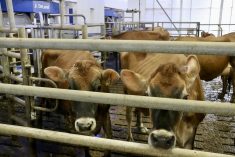A federal private member’s bill that would codify the current government’s promise to leave supply-managed ag commodities out of any future free trade deals has advanced to the committee stage.
Introduced last June 13 by Bloc Quebecois MP Luc Theriault, Bill C-282 came back last Wednesday to pass second reading in the House of Commons and be referred to the Commons standing committee on international trade for review.
Private members’ bills — legislative proposals brought to the Commons by individual opposition MPs or backbenchers, rather than the governing party — typically have slim to zero chance of passage, but are more likely to find traction in a minority government.
Read Also

U.S. grains: Soy hits 17-month high, corn to four-month top as trade braces for U.S. data
Chicago Board of Trade soybean futures rose on Thursday to their highest in nearly 17 months as traders awaited a U.S. government crop report that was expected to lower yield estimates, while also bracing for the resumption of export data to give clues on Chinese buying.
Also, C-282 — which cleared second reading in the Commons Wednesday by a vote of 293 to 23 — touches on an issue politically dear to a majority of MPs. A previous version, C-216, also cleared second reading but died on the order paper ahead of the 2021 federal election.
C-282 would amend the federal Department of Foreign Affairs, Trade and Development Act, requiring that its minister “must not make any commitment” through any international trade treaty or agreement further affecting the tariff wall around Canada’s domestic supply-managed production.
Specifically, it would block a trade minister from offering to either increase other countries’ tariff rate quotas (TRQs) on dairy, poultry or eggs, or lower the duty Canada charges on dairy, poultry or eggs imported beyond that quota.
The bill was put forward in the wake of concessions that granted additional TRQs on dairy, eggs, chicken and turkey coming from countries party to the Canada-U.S.-Mexico Agreement (CUSMA), Canada-E.U. free trade agreement (CETA) and Trans-Pacific Partnership (CPTPP).
In international trade, a TRQ refers to a set quantity of a given commodity or product that can be imported with lower or no tariff. It doesn’t restrict how much can be imported at the full over-quota tariff rate, but Canada’s supply management system sets a prohibitively high tariff wall on such imports.
“We rejoice that the Liberals have rallied to our position in order to offer the Quebecois agricultural economy the support it merits,” Theriault said in a Bloc release Wednesday.
“Agriculture is a very important economic sector, but it’s more than that: it represents a healthy, fair model of management that favours agriculture on a human scale.”
Compensation packages were set up for domestic supply-managed sectors affected by those concessions, and the governing Liberals have pledged not to yield any further market share of supply-managed goods under any pending or future international trade pacts.
However, Simon-Pierre Savard-Tremblay, the Bloc’s trade critic, said in the party’s release Wednesday that C-282 has been “rendered necessary after a series of loopholes in three trade agreements,” even though five previous commitments were made by way of motions in the House of Commons to protect supply management.
Yves Perron, the Bloc’s ag critic, said the party has repeatedly called for this sort of legislation because “we know perfectly well that the United States and other states ‘will always be hungry.'”
The bill has garnered support from supply-managed commodity organizations such as Dairy Farmers of Canada, which said last week C-282 is needed since recent trade pacts have “removed opportunities for Canadian farmers, processors, and other members in the value chain.”
Quebec’s Union des producteurs agricoles (UPA) concurred, with that group’s president Martin Caron saying “concessions with promises of compensation are not a model for trade negotiations.”
Canada has other free trade agreements pending or awaiting negotiations, and it’s important to conserve the supply management system and Canada’s domestic markets “without additional breaches,” he said.
‘Dangerous precedent’
That’s not to say all farm groups are lined up behind C-282. The Canadian Cattle Association, in a statement Monday, said the bill “threatens the ability for Canada to negotiate current and new free trade agreements” and is “detrimental to all Canadian industries who benefit from trade.”
Trade talks, the CCA said, “work by compromise and negotiation (and) coming to the table with no room for compromise while handcuffing our trade negotiators will inevitably lead to poor trade negotiations.”
The CCA said C-282 “also sets a dangerous precedent” in that it “protects the interests of a specific sector in trade negotiations” and “could greatly incentivize our trade partners to adopt similar legislation. If our partners follow a similar path, Canada’s access to international markets will be diminished.”
Dan Darling, president of the Canadian Agri-Food Trade Alliance, which represents the CCA and other trade-dependent ag and agrifood organizations in Canada, said in a separate statement Thursday the bill “contradicts established trade rules and severely constrains Canada’s ability to negotiate the best free trade agreements for all sectors of the Canadian economy, agriculture and non-agriculture alike.”
C-282, he said, “puts our record of support for free trade in jeopardy and has the potential to set us back decades.”
C-282’s path forward through the Commons and Senate also may not be so unanimous. The New Democrats’ ag critic Alistair MacGregor, speaking in support of the bill in the Commons last Nov. 16, said its predecessor C-216 split the caucus of the official opposition Conservatives roughly two-to-one against when it passed second reading in March 2021 by a vote of 250 to 80.
“It will be interesting to see, when this bill comes to second reading vote, what the blue team will be able to do on this,” MacGregor said at the time.
In the same debate last November, John Nater, a Conservative MP from southwestern Ontario, said C-282 “has some challenges in how it would be implemented and how it would be dealt with at the negotiation table, but that is something that could be considered at the committee stage.” — Glacier FarmMedia Network
CORRECTION, Feb. 14, 2023: Paragraph 17 adjusted to fix an incorrect reference to the CCA by its former name. We regret the error.















